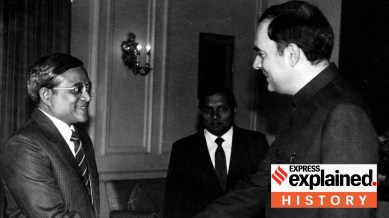Operation Cactus: When India prevented a coup in Maldives
As Maldives’ president-elect doubles down on his ‘India Out’ stance, a look at the events of November 3, 1988, when Indian troops intervened to thwart a coup attempt in the island nation

‘India Out’ was a campaign slogan for Maldives president-elect Mohamed Muizzu, who will take over the country’s reins on November 17. Over the past decade or so, anti-India sentiments have been rising in the island nation — and many Maldivians have a long list of grievances.
Yet, 35 years after the fact, India’s intervention in the 1988 coup attempt in Malé — codenamed Operation Cactus — continues to be remembered with gratitude and fondness. “Across party lines in the Maldives, they don’t criticise this operation. They will mention other issues that they have with India, but not this,” Dr Gulbin Sultana, a Maldives expert, told The Indian Express in 2021.
We recall the events that unfolded on November 3 and 4, 1988 in Maldives, and how India prevented a coup in the island nation.
A decade of coups
Maldives lies to the south-west of the Indian mainland, with its capital Malé slightly more than 600 km away from Thiruvananthapuram. It comprises nearly 1,200 low-lying coral islands sprawled across 90,000 sq km in the Indian Ocean.
Maumoon Abdul Gayoom (born 1937) became president of Maldives in 1978, amidst economic troubles and political instability. Gayoom eventually went on and ruled his country for 30 years, but in the 1980s, he faced three attempted coups (in 1980, 1983 and 1988), led by Maldivians disgruntled at his rule.
The last one would have succeeded, if not for Indian intervention.
Maldivian plotters and 80 Lankan fighters
The 1988 coup was the brainchild of Maldivian businessman Abdullah Luthufee and Ahmed “Sagaru” Nasir, supported by Uma Maheswaran, leader of the People’s Liberation Organisation of Tamil Eelam (PLOTE), a militant Lankan Tamil organisation. After months of preparations, early morning on November 3, 80 PLOTE fighters, as well as a few Maldivian locals including Luthufee and Nasir, arrived in Malé aboard a couple of Lankan freighters.
They were armed with heavy machine guns, AK-47s, grenades and mortars, and had designated objectives to capture important infrastructure in the city, including the headquarters of the NSS, Maldives’ sole armed force. And they were successful in their objectives while suffering minimal losses: they controlled most of Malé by noon, although Gayoom himself had escaped to a safe house.
India gets involved
As the coup unfolded, SOS messages were sent to countries across the world. Arun Bannerjee, then the High Commissioner to the Maldives, was woken up at around 6.30 am in his New Delhi home. By 9 am a crisis committee meeting was underway in South Block, chaired by Prime Minister Rajiv Gandhi. The Indian Army HQ had already been informed of a possible operation.
In Agra, the 50th Independent Parachute Brigade was activated, under Brigadier Farukh Bulsara. 6 Para, commanded by Colonel Subhash C Joshi was designated to lead the operation. By 3:30 pm, the Air Force’s 44 Squadron and the vanguard of the Parachute Brigade were at the airport, waiting for instructions. The High Commissioner too made it to Agra to brief the soldiers.
“The advantage of having the High Commissioner in the team was that he gave us a book in the briefing room that gave us a lot of information that was useful. It was a tourist guide book that you may find in Connaught Place. That was where we got our first look at Malé,” Brigadier Joshi (then Colonel) laughingly told The Indian Express in 2021.
A quick success
At around 9.30 pm local time, two Ilyushin IL-76s, flying non-stop from Agra carrying Indian soldiers and the High Commissioner Bannerjee, landed in Hulhulé, Maldives’ main airport. The effect of the landing on the rebels was instant.
“The rebels — ignorant of the actual strength of the Indian troops — overestimated their numbers and were overwhelmed… they decided to abandon their mission, and flee,” Ashok Chordia, an Indian Air Force veteran involved in the operation, wrote in his book Operation Cactus (2018).
The paratroopers immediately secured the airport before proceeding to the adjacent island of Malé to rescue Gayoom. By this time, Luthufee and some rebels had hijacked a merchant vessel to make their escape, along with seven hostages including the Maldives Transport Minister. Some rebels were left on the island, and were all eventually captured. The president was secured by around 5 am on November 4.
Chase in the high seas
Under orders from Brig Bulsara, the paratroopers fired at the fleeing rebel ship, causing enough damage to slow it down. Now it was the turn of the Navy to intercept the ship and rescue hostages. Frigates INS Betwa (from Kochi), and INS Godavari (returning from a friendly visit to Australia), were activated and tasked with intercepting the fleeing vessel before it entered Sri Lankan territorial waters.
The Indian ships caught up with the rebel vessel on November 5. After tense negotiations, the Indian ships opened fire. Seeing that no escape would be possible, the rebels finally surrendered and were taken aboard INS Godavari.
Aftermath
The attempted coup claimed the lives of 19 people. 68 Sri Lankan fighters and seven Maldivians were eventually arrested, interrogated and put to trial in Maldives. Four, including Luthufee, were given the death sentence which was later commuted at the request of PM Rajiv Gandhi.
Indian paratroopers stayed on in Malé for over a fortnight. But the relationship forged with the island nation has lasted far longer. Even president-elect Muizzu has toned down his rhetoric after the election win. He met the Indian High Commissioner Munu Mahawar three days after the election results came in, holding discussions on “further enhancing bilateral relations between Maldives and India.”